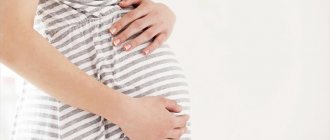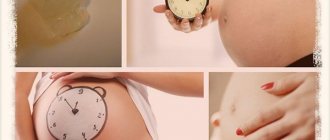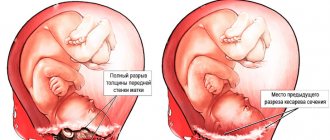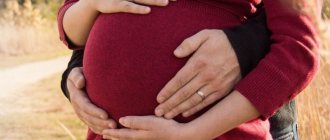Today, giving birth after 30 years is not uncommon and many women deliberately plan pregnancy at a later age, when they are already financially independent, have a stable job and their own property. Of course, childbirth after 30 years has its own characteristics, but there are always certain risks, regardless of the woman’s age.
But nowadays, women still prefer to have a child after 30 years. In this article we will look at the main pros and cons of childbirth over 30 years, the opinions of doctors and the possible risks of this age.
Late or just right - doctors’ opinion
Previously, the ideal age for a woman’s first birth was considered to be between 18-25 years old, and there is a completely scientific basis for this. At a young age, a woman has a healthy and strong body, there are no acquired chronic diseases, her body is in its prime. Hormonal balance is maintained by the ovaries, the vaginal muscles are quite elastic and elastic, the pelvic bones have good mobility, which is very important for childbirth.
All this is extremely important for maintaining the woman’s health, the normal development of the fetus, and childbirth, as a rule, often takes place without the intervention of doctors. The process of restoring physical fitness after childbirth in young women also occurs much faster than in those over 30 years old.
You may be interested in: “Maternity hospital bag: list of things for mother and baby”
Age assessment of women in labor
It is worth noting that the age assessment of women in labor and the opinion of doctors have changed several times over the decades, and at different times women aged 26, 27, 28 and 29 years were considered old-timers, and later, births at the age of 30 years and older were considered late. But the world is changing, living standards are rising, medicine is improving, and at the same time the social status of women and the opinions of specialists.
Today, a pregnant thirty-year-old woman does not surprise either obstetricians-gynecologists or the people around her, since childbirth at this age is a common situation. By the way, the division of pregnant women and women in labor into age categories exists only in Russia. In other countries, there is no age assessment, even if women decide to become pregnant for the first time at the age of 37-39 years or even older, at 40-43 years.
Possible dangers and risks of pregnancy and childbirth after 30 years
Experts around the world note that significant changes occur in a woman’s body with age, and by the age of 30 and older there is a risk of acquiring certain chronic and gynecological diseases, which in turn can complicate pregnancy and childbirth. Of course, for thirty-year-olds, these risks are much lower than for women after forty, and in most cases, pregnancy and childbirth end in the birth of a healthy, beautiful and strong baby.
If we talk about possible risks, then in addition to calendar age, several other factors play a role.
Remember, a healthy pregnancy and successful childbirth largely depend on a woman’s lifestyle, her social and living conditions, genetic factors and hereditary diseases. Congenital malformations can develop in utero as a result of a viral disease or taking certain medications during pregnancy, endocrine disorders, etc.
Therefore, the answer to the question - is it dangerous to give birth after 30 years of age will be ambiguous, since the prognosis in each specific case will be different, depending on the individual characteristics of the female body.
Down syndrome. It is worth noting that there is one factor that has a certain relationship to the age of the mother in labor, and it concerns the estimated basic risks of giving birth to a baby with chromosomal abnormalities.
According to statistics, the risk of having a child with Down syndrome (trisomy 21) increases with age. Moreover, for comparison, pay attention to the numbers: for women at 25 years old, the probability of giving birth to a child with such a diagnosis is no more than 1: 1500. By the age of 30, the risk increases and, according to medical statistics, is already 1: 1000. At 35 years old, a woman the risks of giving birth to a “sunny” baby are estimated at 1: 350. At 36–37 years old, the basic risk is even higher - 1: 214. But after 40 years, the risks are quite high: 1: 19 at 40 years old and 1: 14 at 43 years old.
Edwards, Turner syndrome. Also, women aged 30 years have a risk of giving birth to a baby with Edwards and Turner syndromes. This is explained by the fact that the supply of female eggs is depleted over time, and the quality of the genetic material contained in the germ cells of men and women deteriorates significantly over time under the influence of environmental factors and bad habits.
This makes conception somewhat more difficult, and the likelihood of an “incorrect, erroneous” fusion of sperm and egg increases, which may result in three homologous chromosomes instead of a pair (normally) or other incurable chromosomal abnormalities and mutations.
A woman’s obstetric history plays an important role in predicting the nature of the course of pregnancy and childbirth, and according to statistics, at the age of 30-40 years, many may have had abortions in their personal obstetric history, or have had gynecological or extragenital diseases or menstrual irregularities in the past. As a result, difficulties may arise with bearing the fetus and during childbirth.
The course of pregnancy is complicated if a woman already has chronic diseases, which is fraught with the threat of miscarriage, premature birth, fetal growth restriction syndrome, intrauterine hypoxia (oxygen starvation of the fetus in the womb), anemia of pregnant women (decreased amount of hemoglobin), gestosis - a complication of pregnancy, manifested the appearance of edema, protein in the urine, increased blood pressure, etc.
Benefits of giving birth at an older age
Emotional maturity . By the age of 30, pregnancy is already planned, and not accidental, the woman is preparing for conception and is waiting for the desired child. By this age, a woman already has the necessary knowledge, she knows the intricacies of contraception and has experience in sexual activity. The advantages of age after 30 years are that most women, even those who are not married or do not have a permanent partner, are psychologically more mature and are consciously preparing for the birth of their first child. Women are more relaxed in the process of bearing a child.
By this age, many people no longer worry about not having their own home or lack of money, since they have already received an education and, as a rule, have a permanent job and financial independence. Those women who are aware that there are certain age-related risks are more diligent and follow the recommendations of doctors, they regularly attend all scheduled consultation appointments, take tests and prenatal screenings responsibly, attend courses for expectant mothers, master breathing techniques, learn the intricacies of caring for newborns.
Warm relationship between mother and child. First-born children born to a mother after 30 years of age are surrounded by attention, care and love. They are given more time, and the children, in turn, bring into the life of a thirty-year-old mother a new, previously unknown feeling of true happiness and self-realization in the field of motherhood. As a result, warmer and more trusting relationships are formed between the child and parents.
The birth of a genius . By the way, after 30 years there is a chance for the birth of a genius. Who doesn’t dream of having a child who is different from everyone else—a child prodigy or a genius? Not very young mothers have a much greater chance of succeeding in this, and history knows many similar examples!
Probability of conceiving twins. The likelihood of conceiving twins after 30 years of age increases slightly, but not as much as after 40 years of age.
Reduced likelihood of developing postpartum depression. If you believe the statistics, after the age of 30, most women are less likely to develop postnatal depression after childbirth. Young women giving birth, as well as women over 40 years of age, are most often at risk for its occurrence.
You may be interested in: “How to take a pregnancy test to get an accurate result”
More on the topic Pregnancy at 38 years old - fear, surprise and joy
38 years old, daughter 12... Almost pregnant
And instead of joy and pleasure from the situation, I am tormented by endless black thoughts on all fronts. There are still a million fears about the pregnancy itself (there was anembryonics two years ago. I gave birth to my second daughter at almost 38 years old. The eldest was already 10.5 years old at that time.
Violence in family
Yesterday I came across news about the “Kamchatka chikatilo”, I became curious what kind of animal it was, I followed the links, read it... And I’m still in shock and bewilderment... How could a mother not notice that her new husband had been wrapping her in tape for 5 years and raped her teenage daughter in every way?! O_O And I don’t understand my stepfather... What’s the point of crap like that in your own house, taking risks and dodging, if in our times any sex can be found for free and with impunity at any time of the day?! :/ And the girl, in general...
age, excess weight, late pregnancy
My first pregnancy was at 24 years old and I gained 12kg. I realized a long time ago that only children bring me the greatest joy in life.








